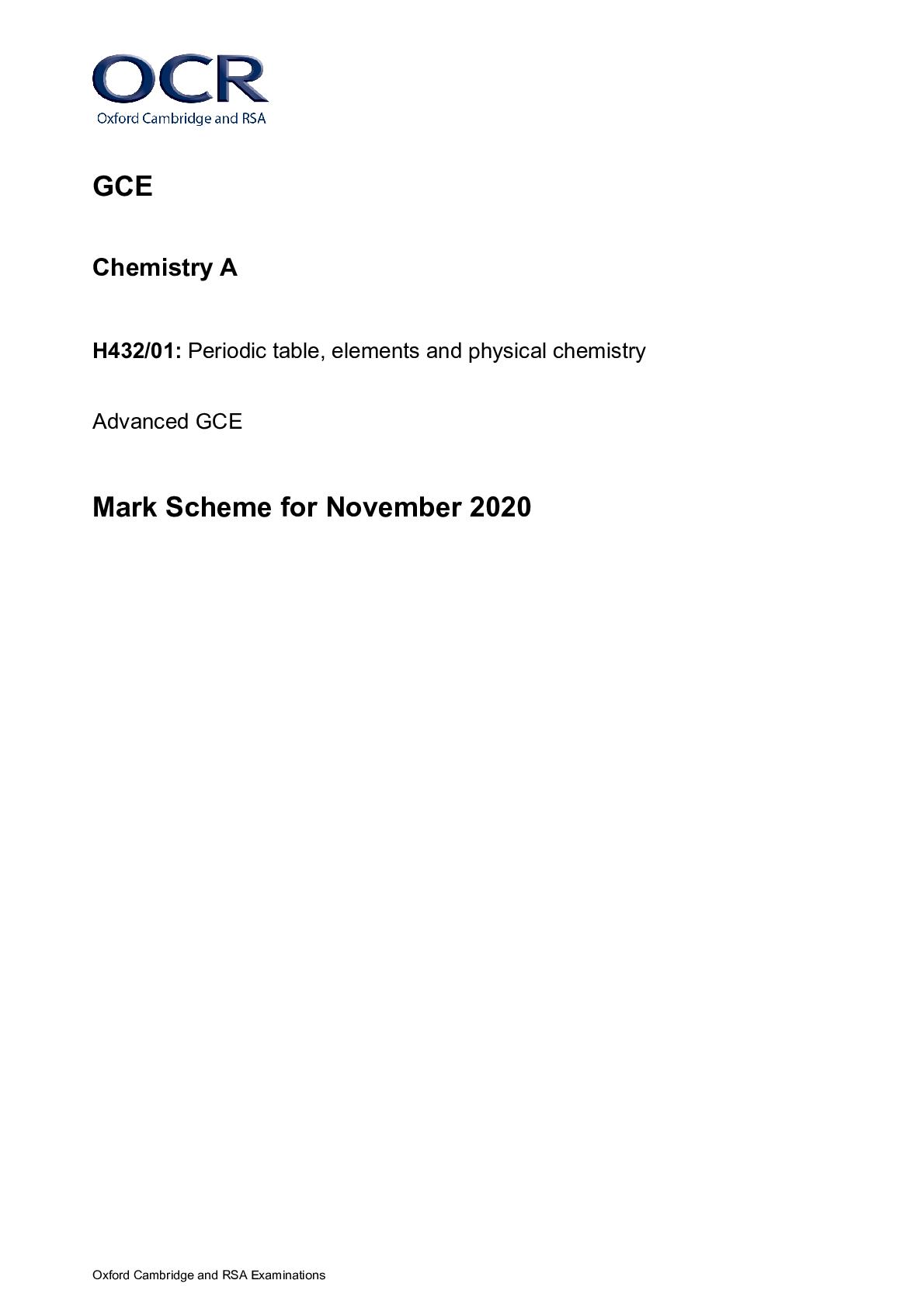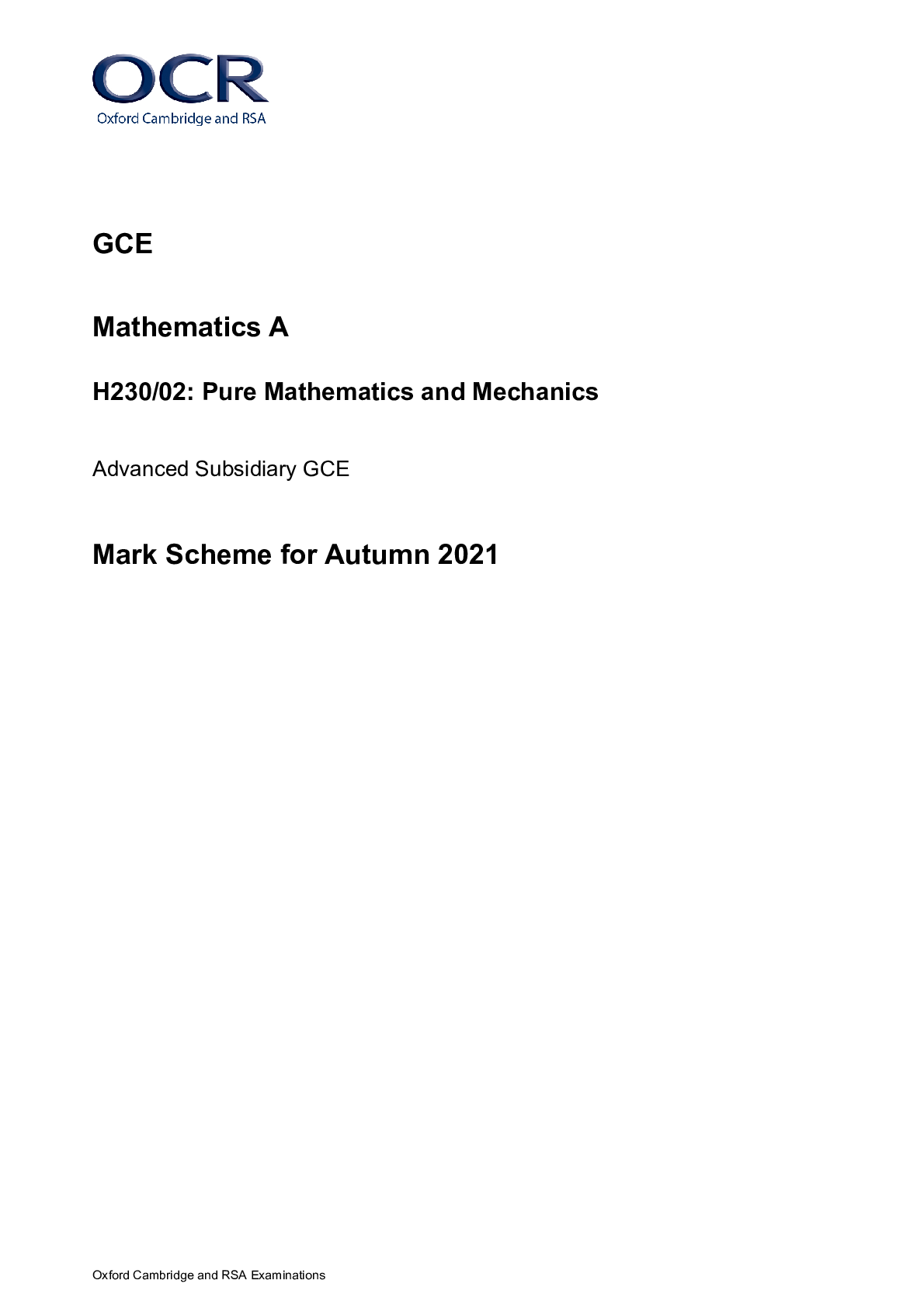Literary Studies > AS Mark Scheme > GCE Classical Greek H044/02: Literature Advanced Subsidiary GCE Mark Scheme for November 2020 (All)
GCE Classical Greek H044/02: Literature Advanced Subsidiary GCE Mark Scheme for November 2020
Document Content and Description Below
GCE Classical Greek H044/02: Literature Advanced Subsidiary GCE Mark Scheme for November 2020 Oxford Cambridge and RSA Examinations GCE Classical Greek H044/02: Literature Advanced Subsidia... ry GCE Mark Scheme for November 2020Oxford Cambridge and RSA Examinations OCR (Oxford Cambridge and RSA) is a leading UK awarding body, providing a wide range of qualifications to meet the needs of candidates of all ages and abilities. OCR qualifications include AS/A Levels, Diplomas, GCSEs, Cambridge Nationals, Cambridge Technicals, Functional Skills, Key Skills, Entry Level qualifications, NVQs and vocational qualifications in areas such as IT, business, languages, teaching/training, administration and secretarial skills. It is also responsible for developing new specifications to meet national requirements and the needs of students and teachers. OCR is a not-for-profit organisation; any surplus made is invested back into the establishment to help towards the development of qualifications and support, which keep pace with the changing needs of today’s society. This mark scheme is published as an aid to teachers and students, to indicate the requirements of the examination. It shows the basis on which marks were awarded by examiners. It does not indicate the details of the discussions which took place at an examiners’ meeting before marking commenced. All examiners are instructed that alternative correct answers and unexpected approaches in candidates’ scripts must be given marks that fairly reflect the relevant knowledge and skills demonstrated. Mark schemes should be read in conjunction with the published question papers and the report on the examination. © OCR 2020H044/02 Mark Scheme November 2020 Annotations Annotation Meaning Blank page Highlight Off page comment Point for which mark is awarded Benefit of doubt Omission of words or part words Error in translation Minor error in translation Consequential error Repeated error Accurate analysis of point in ‘essay’ Text reference mentioned appropriately in essayH044/02 Mark Scheme November 2020 Subject-Specific Marking Instructions Guidance on applying the marking grids for set text translation The general principle in assessing each section should be the proportion (out of 5) of sense achieved. One approach for each section is given. Acceptable alternatives will be illustrated during Standardisation, but examiners should assess on its own merits any approach that satisfactorily conveys the meaning of the Greek – the crucial consideration being the extent to which every Greek word is satisfactorily rendered in some way in the English. The determination of what a “slight” error is only necessary when it is the only error in a section; this distinction will then determine whether a mark of 5 or 4 is appropriate. Where marks of 4, 3, 2, 1 and 0 are applicable, the overall proportion of meaning conveyed in the section is the only consideration. The term “major” error has been used here to determine an error which is more serious than a “slight” error. The classification below should be seen only as a general guide, the intention of which is to maintain standards year-on-year. Lead markers should consider each instance on its own merits in the context of the passage and the section. The sort of errors that we would generally expect to be considered as a “slight” error are: • a single mistake in the translation of a verb, for example incorrect person or tense; • vocabulary errors that do not substantially alter the meaning • omission of particles that does not substantially alter the meaning (although in certain cases the omission of a particle may not count as an error at all, most especially with μεν... δε) The sort of errors that we would generally expect to be considered as a “major” error are: • more than one slight error in any one verb • vocabulary errors that substantially alter the meaning • omission of a word or words, including alteration of active to passive if the agent is not expressed • missed constructions • alteration in word order that affects the sense The final decisions on what constitutes a “slight” and “major” error will be made and communicated to assessors via the standardisation process (after full consideration of candidates’ responses) and these decisions will be captured in the final mark scheme for examiners and centres. Marks Description 5 Accurate translation with one slight error allowed 4 Mostly correct 3 More than half right 2 Less than half right 1 Little recognisable relation or meaning to the GreekH044/02 Mark Scheme November 2020 Guidance on applying the marking grids for the 10-mark extended response question Two Assessment Objectives are being assessed in Questions 1(i), 2(i), 3(g) and 4(i) – AO2 (Demonstrate knowledge and understanding of literature) and AO3 (Critically analyse, evaluate and respond to literature). The two Assessment Objectives are equally weighted. Examiners must use a best fit approach to the marking grid. Where there are both strengths and weaknesses in a particular response, particularly imbalanced responses in terms of the assessment objectives, examiners must carefully consider which level is the best fit for the performance overall. For example, you should not be able to achieve a mark of 8 made up of AO2 = 6 and AO3 = 2. Responses are credited for AO2 for the detail and accuracy of the knowledge of the set text they deploy and for their understanding of the set text as well as the social, historic and cultural context for the set text. For the highest level, candidates are expected, where relevant, to bring in knowledge and understanding from the material they have read in English. Responses are credited for AO3 for how well the response addresses the question, for candidates selecting relevant examples from the set texts they have studied and drawing and expressing conclusions based on the selected examples in relation to the question posed. Candidates will be assessed on the quality of the conclusions and points they argue and the range and quality of the examples they have selected. 10-mark grid for the extended response question AO2 = 5 marks = Demonstrate knowledge and understanding of literature AO3 = 5 marks = Critically analyse, evaluate and respond to literature Level Marks Characteristics of performance 5 9-10 • detailed knowledge and excellent understanding of the material studied in Greek including, where appropriate, the social, cultural and historic context and, where relevant, material studied in translation (AO2) • well-argued response to the question which is supported by a range of well-selected examples (AO3) The response is logically structured, with a well-developed, sustained and coherent line of reasoning. 4 7-8 • good knowledge and sound understanding of the material studied including, where appropriate, the social, cultural and historic context (AO2) • a good response to the question which is supported by some well-selected examples (AO3) The response is logically structured, with a well-developed and clear line of reasoning. 3 5-6 • some knowledge and understanding of the material studied including, where appropriate, the social, cultural and historic context (AO2) • a reasonable response to the question which is supported by some points from the set text (AO3) The response presents a line of reasoning which is mostly relevant and has some structure. 2 3-4 • limited knowledge and understanding of the material studied including, where appropriate, the social, cultural and historic context (AO2) • a limited response to the question which is occasionally supported by reference to the set text (AO3) The response presents a line of reasoning but may lack structure. 1 1-2 • very limited knowledge and understanding of the material studied including, where appropriate, the social, cultural and historic context (AO2) • a very limited response to the question with very limited reference to the set text (AO3) The information is communicated in an unstructured way. 0 = No response or no response worthy of credit.H044/02 Mark Scheme November 2020 Question Answer Mark Guidance 1 (a) Accept any two of: The conquest of Egypt was complete (1); he wanted to find out what the leading men of the country thought about the war with Athens (1) he wanted to explain his own wishes about this. (1) AO2 2 For what reason did Xerxes convene this meeting? 1 (b) Assess against criteria in the 5-mark AO2 grid (see above). ἄνδρες Πέρσαι, οὔτ᾽ αὐτὸς κατηγήσομαι νόμον τόνδε ἐν ὑμῖν τιθείς, παραδεξάμενός τε αὐτῷ χρήσομαι. ὡς γὰρ ἐγὼ πυνθάνομαι τῶν πρεσβυτέρων, οὐδαμά κω ἠτρεμίσαμεν, ἐπείτε παρελάβομεν τὴν ἡγεμονίην τήνδε παρὰ Μήδων, Κύρου κατελόντος Ἀστυάγεα· ἀλλὰ θεός τε οὕτω ἄγει καὶ αὐτοῖσι ἡμῖν πολλὰ ἐπέπουσι συμφέρεται ἐπὶ τὸ ἄμεινον. Suggested translation: Men of Persia, I will not myself be the first to bring in this practice amongst you and having received it I will use it. For as I learn from (my) elders, we Persians have never yet kept quiet since we took over leadership from the Medes, when Cyrus deposed Astyages, but god leads in this way and as we ourselves pursue many activities things turn out better. AO2 5 The below are intended as examples of “slight” and more serious “major” errors, others may be identified at standardisation. Slight Major 1 (c) Accept any four points and award up to two marks each. Assess against point-by-point marking grid below. 2 expresses a valid point based on a relevant aspect of content or aspect of literary style, with accurate, relevant and suitably explained reference to the Greek 1 expresses a valid point, but is not fully supported by an appropriate selection of AO3 8 τὰ μέν … ὑμῖν (lines 6–15): how does Xerxes highlight the significance of what he is proposing? Any valid answer to the question will be given due credit.H044/02 Mark Scheme November 2020 content or aspect of literary style or reference to the Greek 0 Point is not valid, or none are drawn Answers may include: • Κῦρός τε καὶ Καμβύσης πατήρ τε <ὁ> ἐμὸς Δαρεῖος: the list of revered names culminating in Xerxes’ father; the early positioning in the sentence provides some further emphasis. • κατεργάσαντο καὶ προσεκτήσαντο: two verbs to emphasise their activity (note προσ-). • παρέλαβον τὸν θρόνον τοῦτον: draws attention to his status as king. • ἐφρόντιζον: imperfect tense, indicating activity over time. • λείψομαι: emphatic future tense. • τῶν πρότερον γενομένων: picks up on the names mentioned earlier, and again underlines Xerxes’ royal heritage. • μηδὲ ἐλάσσω προσκτήσομαι δύναμιν: verb also repeated, though here for what Xerxes himself will do. • ἅμα μὲν … ἅμα δὲ: ties together two aspects of what he wants to achieve • κῦδος ἡμῖν προσγινόμενον: so heroic glory is put first (note προσ-) • οὐκ ἐλάσσονα οὐδὲ φλαυροτέρην παμφορωτέρην τε: three comparatives, the last most positive • τιμωρίην τε καὶ τίσιν: strongly linked abstract nouns • διὸ ὑμέας νῦν ἐγὼ συνέλεξα: underlines the reason for Xerxes’ speech 1 (d) He intends to build a bridge over the Hellespont (1) Then take an army through Europe to Greece (1) So that he can take vengeance on the Athenians (1) AO2 3 μέλλω ζεύξας … ἐμόν (lines 15–17): what proposal does Xerxes make?H044/02 Mark Scheme November 2020 For what they did to the Persians and his father (1) 1 (e) Accept any four points and award up to two marks each. Assess against point-by-point marking grid below. 2 expresses a valid point based on a relevant aspect of content or aspect of literary style, with accurate, relevant and suitably explained reference to the Greek 1 expresses a valid point, but is not fully supported by an appropriate selection of content or aspect of literary style or reference to the Greek 0 Point is not valid, or none are drawn Answers may include: • τί δείσαντες: first of three short, abbreviated questions (τί … κοίην … κοίην), which allows Mardonius to suggest the Greeks do not pose a threat • ἐπιστάμεθα μὲν … ἐπιστάμεθα δὲ: repetition to underline the weakness of Greek μάχην and δύναμιν • παῖδας: used as a derogatory term • καταστρεψάμενοι: underlines the domination of Ionia • ἐν τῇ ἡμετέρῃ: Mardonius emphaises that these Greeks now live in ‘our’ territory • Ἴωνές τε καὶ Αἰολέες καὶ Δωριέες: the list of three (of the four) Greek tribes underlines the Persian mastery of the Greeks (and this would be even more effective for a Greek audience) AO3 8 τί δείσαντες … μάχην (lines 1–8): how does Herodotus emphasise the strength of Mardonius’ argument here? Make four points and support your answer with reference to the Greek text. Any valid answer to the question will be given due credit.H044/02 Mark Scheme November 2020 • ἐπειρήθην δὲ καὶ αὐτὸς: highlights Mardonius’ personal experience (without emphasising his previous lack of success) • ὑπὸ πατρὸς τοῦ σοῦ κελευσθείς: family link • μέχρι Μακεδονίης: again, this probably works better for a Greek audience • ὀλίγον ἀπολιπόντι ἐς αὐτὰς Ἀθήνας: the particular role of Athens in the Ionian revolt and in Persian ideas of vengeance highlighted • οὐδεὶς ἠντιώθη ἐς μάχην: Mardonius argues that the Greeks will not dare to oppose 1 (f) The Greeks start wars without making plans through folly and ineptitude (1) When they do fight, they find the most beautiful and most level place (1) With the result that the victors depart with heavy losses (1) And those who are defeated are utterly destroyed (1) AO2 4 καίτοι γε … γίνονται (lines 9–14): what details does Mardonius reveal about Greek warfare? 1 (g) Assess against criteria in the 10-mark essay grid (see above). Arguments may include (AO3): Herodotus sets out some of the background in the set text and also presents the arguments through different speakers. Candidates may focus on the way in which these individual speakers are characterised, and also on the way in which their arguments are presented, reflecting their status at court. They may also comment on what they have found ‘vivid and entertaining’ in Herodotus’ presentation of the Persian court. There is no “right answer”, all arguments put forward by students should be assessed and credited on their own merits. Marking focus should be on how competently the response gathers and interprets evidence from the text, 10 made up of AO2 = 5& AO3 = 5 How does Herodotus make his depiction of Persians in his Histories vivid and entertaining? An AO2-heavy response may focus on details from the set texts but not draw many valid conclusions. This is likely to limit the level at which this work can be rewarded. Examiners should credit any accurate references to relevant material outside of the Greek prescription that a candidate brings into their answer. Credit discussion of Herodotus’ sources and general approach to historiography.H044/02 Mark Scheme November 2020 rather than whether the examiner agrees with the conclusion. Supporting evidence may include (AO2): • Xerxes’ lack of interest in attacking Greece, focusing first on Egypt (7.5) • The role of Mardonius and his justification for the proposed invasion (7.5) • Mardonius draws attention to the injury done to Persia by the Athenians (7.5) • Mardonius emphasised the beauty of Greece (7.5), but he also had hope of being appointed governor (7.6) • The role of the Aleuadae from Thessaly and also the family of Pisistratus who brought Onomacritus, a collector of oracles to Susa (7.6) • Herodotus credits this Greek advice with persuading Xerxes, though he first dealt with Egypt (7.7) • Xerxes called a conference where he announced his intention to invade Greece (7.8) • Xerxes emphasised the activity of the Persians since the time of Cyrus, so he wanted to add to the power of Persia (7.8) • Xerxes sets out his plan for invading Greece via the Hellespont, reminding the leading men of Darius’ intentions and the damage caused the Athenians with Aristagoras at Sardis and the defeat of Datis and Artaphernes at Marathon (7.8) • Xerxes thinks that conquering Greece & Europe will underline the importance of Persia and ensure there are no rivals to match them (7.8) • Xerxes wants the leading men to bring troops, but he also invites an open debate (7.8) • Mardonius responds by praising Xerxes as the greatest, as he intends to punish the Greeks for what they have done, and he highlights theH044/02 Mark Scheme November 2020 weakness of Greece, including their way of fighting that brings disaster on the losers ((7.9) • Mardonius also highlights that the Greeks did not come to face him when he led an army into Macedonia, so he claims the Greeks will not resist if the Persians march in with all their forces (7.9) • There was silence after Mardonius’ words, until Artabanus, Xerxes’ uncle, responded, who brought up the difficulties faced by Darius (his brother) in Scythia where many men were lost (7.10) • Artabanus underlines the high reputation of the Greeks, and the victory of the Athenians at Marathon; and he points out the risk, especially with a weak point over the Hellespont, where the Greeks had had an opportunity to harm Darius, and only the support of Histiaeus prevented this (7.10) • Artabanus urged Xerxes to take time over his decision, and emphasised the importance proper preparation (7.10) • Artabanus also highlighted that God acts against the great ones who show off and bring down vengeance on their heads; God ‘in his envy’ brings defeat on great armies (7.10) • Artabanus draws attention to Mardonius’ enthusiasm and his one-sided portrait of the Greeks; and offers a bet to Mardonius, that each should stake their children upon the outcome (7.10) • Artabanus prophesises that Mardonius will bring disaster upon Persia and his body will be prey to dogs (7.10)H044/02 Mark Scheme November 2020 Question Answer Mark Guidance 2 (a) Assess against criteria in the 5-mark AO2 grid (see above). τί δέ, ὦ Σώκρατες, ἔφη ὁ Κρίτων, ἄλλο γε ἢ πάλαι μοι λέγει ὁ μέλλων σοι δώσειν τὸ φάρμακον ὅτι χρή σοι φράζειν ὡς ἐλάχιστα διαλέγεσθαι; φησὶ γὰρ θερμαίνεσθαι μᾶλλον διαλεγομένους, δεῖν δὲ οὐδὲν τοιοῦτον προσφέρειν τῷ φαρμάκῳ: εἰ δὲ μή, ἐνίοτε ἀναγκάζεσθαι καὶ δὶς καὶ τρὶς πίνειν τούς τι τοιοῦτον ποιοῦντας.’ Suggested translation: ‘Socrates’, said Crito, ‘only that for a long time the man who will give you the drug has been saying to me that I should tell you to speak as little as possible. For he says that men who speak more grow warm, and you ought not to add anything like this to the drug. Otherwise, sometimes those who act like this have to drink poison a second or third time.’ AO2 5 The below are intended as examples of “slight” and more serious “major” errors, others may be identified at standardisation. Slight Major 2 (b) Any two of: Socrates is unworried about taking a second or third dose of the drug (1) And tells Crito to tell the guard to prepare it (1) Crito says he knew what Socrates would say (1) AO2 2 καὶ ὁ … παρέχει (line 6–9): what do these lines show us about Socrates’ character? 2 (c) Accept any four points and award up to two marks each. Assess against point-by-point marking grid below. 2 expresses a valid point based on a relevant aspect of content or aspect of literary style, with accurate, relevant and suitably explained reference to the Greek 1 expresses a valid point, but is not fully supported by an appropriate selection of AO3 8 ἔα αὐτόν … τεθνάναι (line 10–18): how does Socrates introduce his argument in response to Simmias’ challenge? Make four points and support your answer with reference to the Greek text. Any valid answer to the question will be given due credit.H044/02 Mark Scheme November 2020 content or aspect of literary style or reference to the Greek 0 Point is not valid, or none are drawn Answers may include: • ἔα αὐτόν: Socrates quickly moves away from the interruption of the guard • ὑμῖν δὴ τοῖς δικασταῖς: Socrates acknowledges he needs to provide a ‘defence’ as if he were in court before jurors (δικασταῖς) • τὸν λόγον ἀποδοῦναι: Socrates is going to pay what is owed, an account that will satisfy his listeners • τῷ ὄντι: common Platonic idiom, here emphasising that Socrates is speaking about genuine philosophers • ἐν φιλοσοφίᾳ διατρίψας τὸν βίον: a phrase which could be seen to embody Socrates’ approach to life • θαρρεῖν … καὶ εὔελπις εἶναι: here Socrates seeks to explain why he is optimistic • ἐκεῖ μέγιστα οἴσεσθαι ἀγαθὰ: Socrates emphasises the advantages that death holds for the philosopher (note middle verb) • ὀρθῶς ἁπτόμενοι φιλοσοφίας: so only a select group of people will be capable of achieving this • οὐδὲν ἄλλο: emphasises the goal • ἐπιτηδεύουσιν: philosophers apply their skill to this problem • ἀποθνῄσκειν τε καὶ τεθνάναι: credit discussion of the two tenses of the infinitive. 2 (d) Any three of: It would be strange if philosophers who have been looking forward to death through their whole lives (1) Did anything but this (1) But were annoyed when death arrived (1) AO2 3 εἰ οὖν … ἐπετήδευον (line 18–21): according to Socrates, what follows if this argument is true?H044/02 Mark Scheme November 2020 Which they had been preparing for and looking forward to for so long (1) 2 (e) Any three of: He says that Socrates made him laugh (1) He says that most people would think this an attack on philosophers (1) Because they are half-dead already (1) And death would serve the philosophers right (1) AO2 3 How does Simmias respond to what Socrates has just said? 2 (f) Accept any three points and award up to two marks each. Assess against point-by-point marking grid below. 2 expresses a valid point based on a relevant aspect of content or aspect of literary style, with accurate, relevant and suitably explained reference to the Greek 1 expresses a valid point, but is not fully supported by an appropriate selection of content or aspect of literary style or reference to the Greek 0 Point is not valid, or none are drawn Answers may include: • φιλοσόφου ἀνδρὸς: this argument can only be applied to the philosopher • ἐσπουδακέναι: emphasis on the main activity pursued by a philosopher • περὶ τὰς ἡδονὰς καλουμένας τὰς τοιάσδε, οἷον σιτίων τε καὶ ποτῶν: so Socrates seeks to tease out what separates a philosopher from others, with particular reference to pleasure. The question is designed to elicit the answer it does from Simmias • τί δὲ τὰς τῶν ἀφροδισίων: an abbreviated repetition: Socrates runs through the main distractions that face men. AO3 6 φαίνεταί … αὐτῶν (line 1–10): how effective is the language that Socrates uses to convince Simmias in these lines? Make three points and support your answer with reference to the Greek text. Any valid answer to the question will be given due credit.H044/02 Mark Scheme November 2020 • τὰς ἄλλας τὰς περὶ τὸ σῶμα θεραπείας: here he continues with other ‘bodily’ pleasures. • δοκεῖ σοι ἐντίμους ἡγεῖσθαι ὁ τοιοῦτος: again Socrates emphasises that we are considering a very particular sort of person (philosopher). • ἱματίων διαφερόντων κτήσεις καὶ ὑποδημάτων: Socrates again highlights something that would appeal to ordinary men, but not to a philosopher • τιμᾶν δοκεῖ σοι ἢ ἀτιμάζειν: Socrates makes the argument easy for Simmias to assent to by using repeated ideas 2 (g) Any three of: The true philosopher places no value on them (1) So a man of this kind should be not at all preoccupied with the body (1) But as much as possible should stand apart from it (1) And turn towards the soul (1) AO2 3 ἀτιμάζειν … τετράφθαι (line 11–14): what conclusions do Socrates and Simmias reach? 2 (h) Assess against criteria in the 10-mark essay grid (see above). Arguments may include (AO3): Candidates should focus both on the argument presented in the sections they have studied and also the manner. There is scope to discuss Socrates’ interaction with those who were present, including the prison guard, as well as the way he varies his line of argument. Candidates should evaluate how effectively Socrates sets out his views concerning the significance of death for the philosopher and the response of his followers. There is no “right answer”, all arguments put forward by students should be assessed and credited on their own merits. Marking focus should be on how competently the response gathers and interprets evidence from the text, 10 made up of AO2 = 5& AO3 = 5 ‘For Socrates, death was not something to be feared.’ How well does Plato’s Socrates make his case in the Phaedo? An AO2-heavy response may focus on details from the set texts but not draw many valid conclusions. This is likely to limit the level at which this work can be rewarded. Examiners should credit any accurate references to relevant material outside of the Greek prescription that a candidate brings into their answer.H044/02 Mark Scheme November 2020 rather than whether the examiner agrees with the conclusion. Supporting evidence may include (AO2): • Cebes questions whether philosophers would be willing to die, as if we are the possessions of the gods, it would be strange if the wisest men would be not be sorry to leave the best masters (62cd) • A foolish person might want to be escape but a sensible one would want to stay with his superior; this would suggest that wise men would grieve when they die, but fools would be glad (62de) • Socrates said that Cebes was always examining arguments and did not accept things at face value. Simmias suggested his remarks were aimed at Socrates (62e/63a) • Socrates agreed to defend what he said about death; he did not grieve because he expected to join gods and better men, a better outcome for good men than for bad men (63abc) • Socrates agrees to explain this; but Crito interjects that the prison guard suggests that Socrates not talk so much as the poison may work differently if he is excited, and he may need a bigger dose (63e) • Socrates tries to explain why a man who has devoted his life to philosophy should be cheerful facing death; as such a man has in fact been preparing for death all his life (64a) • Simmias laughs because most people think philosophers are half-dead; but Socrates says they do not understand what this means, and asks whether there is something called death, which is the release of the soul from the body (64bc) • Socrates asks if philosophers should concern themselves with bodily pleasures or sex; Simmias says they should despise such things but should focus on the soul (64de)H044/02 Mark Scheme November 2020 • Socrates the says that most people think that someone who does not focus on the pleasures of the body has one foot in the grave (65a) • Socrates points out that sight and hearing are fallible; and so too the other senses; so the body leads the soul astray from the truth (65b) • The soul can best reflect when it is free from distractions, and so the philosopher should seek to free his soul from the body (65c) • The soul cannot understand beauty and goodness through the body but through the intellect, and so must cut himself off from the body (65de) • Socrates says that the body contaminates the soul and so the soul cannot arrive at truth, because of both distractions and diseases. The body involves us in distractions like war (66abc) • So if we are to get to truth, we must free ourselves from the body to avoid disturbance. So we can only attain the wisdom we seek when we are dead; we cannot know anything properly with the body, and either it is impossible to know anything or only when we are dead (66e) • When we live, we can only get close to knowledge by separating ourselves from the body except when necessary. We should aim to purify ourselves until god gives deliverance (67a) • When we are uncontaminated we shall eventually arrive at truth. It is not right for those who are not pure to achieve purity. Those who properly love knowledge would think this way. Simmias agrees (67b) • So Socrates says there is much hope that one who has striven in life for learning will attain it when he goes where Socrates is going (67b) • So we achieve this purity by striving to separate oneself from the body as much as possible; and death is a separation of body and soul. This is what philosophy is all about (67cd)H044/02 Mark Scheme November 2020 • After this sort of training, separating body from soul, it would be ridiculous for a man to be distressed at death. So true philosophers are focused on death, and death should be least of all fearful to them (67de)H044/02 Mark Scheme November 2020 Question Answer Mark Guidance 3 (a) Patroclus lies dead (1) And men are fighting around his naked body (1) Hector has gained possession of his armour (1) AO2 3 κεῖται … Ἕκτωρ (lines 1–2) what news does Antilochus bring? 3 (b) Assess against criteria in the 5-mark AO2 grid (see above). ὣς φάτο, τὸν δ᾽ ἄχεος νεφέλη ἐκάλυψε μέλαινα: ἀμφοτέρῃσι δὲ χερσὶν ἑλὼν κόνιν αἰθαλόεσσαν χεύατο κὰκ κεφαλῆς, χαρίεν δ᾽ ᾔσχυνε πρόσωπον: νεκταρέῳ δὲ χιτῶνι μέλαιν᾽ ἀμφίζανε τέφρη. αὐτὸς δ᾽ ἐν κονίῃσι μέγας μεγαλωστὶ τανυσθεὶς κεῖτο, φίλῃσι δὲ χερσὶ κόμην ᾔσχυνε δαΐζων. Suggested translation: Thus he spoke, and the black cloud of pain covered him. Taking the sooty dust in both hands he poured it down over his head, and he defiled his beautiful face. Black ash settled upon his fragrant tunic. Achilles lay there, stretched out huge and far and wide in the dust, and he defiled his hair tearing it with his own hands. AO2 5 The below are intended as examples of “slight” and more serious “major” errors, others may be identified at standardisation. Slight Major 3 (c) Accept any four points and award up to two marks each. Assess against point-by-point marking grid below. 2 expresses a valid point based on a relevant aspect of content or aspect of literary style, with accurate, relevant and suitably explained reference to the Greek 1 expresses a valid point, but is not fully supported by an appropriate selection of content or aspect of literary style or reference to the Greek 0 Point is not valid, or none are drawn AO3 8 δμῳαὶ δ᾽ … σιδήρῳ (lines 9–15): how does Homer make this a powerful and moving scene? Make four points and support your answer with reference to the Greek text. Any valid answer to the question will be given due credit.H044/02 Mark Scheme November 2020 Answers may include: • δμῳαὶ: changes the focus of the passage to the minor characters • Ἀχιλεὺς ληΐσσατο Πάτροκλός τε: this links Achilles and Patroclus, and also highlights the status of the δμῳαὶ • θυμὸν ἀκηχέμεναι μεγάλ᾽ ἴαχον: emphasises their grief; women played an important part in grieving • ἐκ δὲ θύραζε / ἔδραμον: the women were inside, but here enter the public sphere; the enjambement of the verb helps emphasise their activity • στήθεα πεπλήγοντο: one of the ritual actions of grieving • λύθεν δ᾽ ὑπὸ γυῖα ἑκάστης: emphasises the impact on each of them (and also reminds us of a formula employed in battle for men) • ὀδύρετο δάκρυα λείβων: emphasises his grief • χεῖρας ἔχων Ἀχιλῆος: Achilles’ excessive grief, like his excessive anger, is a potential problem for the Greeks • ἔστενε κυδάλιμον κῆρ: the focus returns to Achilles • δείδιε γὰρ μὴ λαιμὸν ἀπαμήσειε σιδήρῳ: raises the prospect of suicide. 3 (d) Any three of: Thetis addressed him in tears (1) She must lose Achilles to an early death (1) Directly after Hector dies (1) Achilles’ own doom is certain (1) AO2 3 What has Thetis just said to provoke this reaction from Achilles? 3 (e) Any three of: He prays for his own death (1) As he was not able to protect his comrade as he lay dying (1) AO2 3 αὐτίκα τεθναίην … γενέσθαι (lines 1–3): how does Achilles show his sense of responsibility for what has happened?H044/02 Mark Scheme November 2020 He has perished far from his homeland (1) And Patroclus needed him to be his defender against destruction (1) 3 (f) Accept any four points and award up to two marks each. Assess against point-by-point marking grid below. 2 expresses a valid point based on a relevant aspect of content or aspect of literary style, with accurate, relevant and suitably explained reference to the Greek 1 expresses a valid point, but is not fully supported by an appropriate selection of content or aspect of literary style or reference to the Greek 0 Point is not valid, or none are drawn Answers may include: • νῦν δ᾽: strong pointer back to the current situation, though this section deals with significant decisions made by Achilles • οὐ νέομαί γε φίλην ἐς πατρίδα γαῖαν: Achilles has made his decision to seek vengeance and so seal his fate • οὐδέ τι Πατρόκλῳ γενόμην φάος: interesting visual image • οὐδ᾽ ἑτάροισι / τοῖς ἄλλοις: many other Greeks had died, just as Achilles had asked of his mother at the start • οἳ δὴ πολέες δάμεν Ἕκτορι δίῳ: the responsibility is placed on Hector • ἀλλ᾽ ἧμαι: Achilles draws attention to his own failure to participate • παρὰ νηυσὶν: not fighting, in other words • ἐτώσιον ἄχθος ἀρούρης: a devastating phrase to apply to himself AO3 8 νῦν δ᾽ … ἀνάγκῃ (lines 4–16): how does Homer make this an intense and emotional speech? Make four points and support your answer with reference to the Greek text.? Any valid answer to the question will be given due credit.H044/02 Mark Scheme November 2020 • τοῖος ἐὼν οἷος οὔ τις Ἀχαιῶν: Achilles’ predominence in war is highlighted by the impact of his war cry • ἀγορῇ δέ τ᾽ ἀμείνονές εἰσι καὶ ἄλλοι: he also shows some self-awareness of his own limitations • ὡς ἔρις ἔκ τε θεῶν ἔκ τ᾽ ἀνθρώπων ἀπόλοιτο καὶ χόλος: powerful use of abstract nouns to underline just what lay behind the disastrous events that led to this situation • πολὺ γλυκίων μέλιτος καταλειβομένοιο: change of direction to emphasise just how effectively anger/strife can work their way into the hearts of men. Credit discussion of ‘honey’ • ἠΰτε καπνός: credit discussion of the significance of smoke here • ἐχόλωσεν ἄναξ: the responsibility lies with Agamemnon • τὰ μὲν προτετύχθαι: Achilles draws a line under the past • ἀχνύμενοί περ: emotional state • δαμάσαντες ἀνάγκῃ: powerful final word 3 (g) Assess against criteria in the 10-mark essay grid (see above). Arguments may include (AO3): Candidates will focus primarily on the set text, selecting details of this story that show how the death of Patroclus impacts both sides in the fighting and also refocuses Achilles’ attention on what has happened in his absence from the fighting. Candidates may focus on Achilles’ determination to take his revenge on Hector and the significance for him (his own early death and lasting glory). 10 made up of AO2 = 5 & AO3 = 5 How does Iliad XVIII highlight the importance of warfare to Homeric heroes? An AO2-heavy response may focus on details from the set texts but not draw many valid conclusions. This is likely to limit the level at which this work can be rewarded. Examiners should credit any accurate references to material outside of the Greek prescription that a candidate brings into their answer.H044/02 Mark Scheme November 2020 There is no “right answer”, all arguments put forward by students should be assessed and credited on their own merits. Marking focus should be on how competently the response gathers and interprets evidence from the text, rather than whether the examiner agrees with the conclusion. Supporting evidence may include (AO2): • Antilochus came to Achilles to tell him about the fighting. Achilles had already guessed something had gone wrong, leading to the death of the best of the Myrmidons. • Antilochus told him that Patroclus lay dead, with fighting over his body. Achilles put dust on his head; he tore at his hair on the ground. The slave girls wept around him. • Achilles cried out and his mother heard him. (38) • Thetis lamented in her cave. ‘I bore a son but will never welcome him back home. I cannot help him in his grief’. • Thetis came to Achilles and took his head in her arms. She asked him what grieved him; had not Zeus done as he wished. • Achilles agreed he had, but the death of Patroclus hit him hard. Hector has taken the armour belonging to Achilles. Achilles now wishes revenge. • Thetis tells him that his death will soon follow after the killing of Hector. • Achilles wishes to die at once as he could not save Patroclus. He remembers his anger against Agamemnon. So he decides to fight against Hector and accept his own death when Zeus wills it. Even Heracles died. So he wishes to win great glory.H044/02 Mark Scheme November 2020 • Thetis told him it was good to save his companions. But he no longer had armour, as Hector had it now, but not for long. She told him not to enter the war until she returned with armour from Hephaistos. • She told her nymphs she was off to Olympus to see Hephaistos. And so they all left. • Meanwhile the Achaeans fled from Hector’s attack, and the Trojans were gaining Patroclus’ body back. Three times Hector almost got it but was battered away by the two Aiantes. But Hector did not give up. • He was like a tawny lion who country shepherds try to chase away from a carcass. • Iris came from Olympus to tell Achilles to arm himself, Hera had sent her. She told him to enter the battle. • Achilles asked who had sent her; she told him Hera. • Achilles said that he had no armour, and Thetis had told him to wait. He could have used the armour of Aias, son of Telamon, but he was using it. • Iris then suggested he went to the camp ditch and showed himself to the enemy, as that would give the Greeks some relief. • Achilles rose, and with him Athene with her aegis; she placed a golden cloud round his head and made a flame burn from it. • As when smoke rises from a city on an island where enemies attack, so they hope the smoke from a line of beacons will bring neighbours to help them. • At the ditch Achilles shouted, with Athene shouting beside him, terrifying the Trojans. • Achilles’ voice was like a trumpet sharp and clear when a city is attacked.H044/02 Mark Scheme November 2020 • The Trojans were shaken with fear, even their horses turned, and their charioteers when they saw the flame over Achilles. • Three times Achilles shouted; Twelve of the Trojans died by their own chariots or spears. The Greeks dragged Patroclus out of range. • His companions mourned him, as did Achilles, shedding warm tears as he could not welcome his trusty friend home whom he had sent to war.H044/02 Mark Scheme November 2020 Question Answer Mark Guidance 4 (a) Any two from: Medea has said she is utterly destroyed (1) Her enemies are now in the ascendant (1) There is no easy escape from her situation (1) However she will ask Creon why he banishes her (1) AO2 2 What has Medea just said to provoke this response from Creon? 4 (b) Accept any four points and award up to two marks each. Assess against point-by-point marking grid below. 2 expresses a valid point based on a relevant aspect of content or aspect of literary style, with accurate, relevant and suitably explained reference to the Greek 1 expresses a valid point, but is not fully supported by an appropriate selection of content or aspect of literary style or reference to the Greek 0 Point is not valid, or none are drawn Answers may include: • δέδοικά σ᾽: he starts abruptly, straight to the point • οὐδὲν δεῖ παραμπίσχειν: Creon wants to make his meaning clear • μή μοί τι δράσῃς παῖδ᾽ ἀνήκεστον κακόν: the initial τι δράσῃς is expanded by ἀνήκεστον κακόν, and Creon also makes clear that his fears centre on his child • πολλὰ τοῦδε δείγματα: Creon picks out the evidence on which this fear is based • σοφὴ πέφυκας καὶ κακῶν πολλῶν ἴδρις: here he emphasises Medea’s reputation for unnatural cleverness • λυπῇ: her emotional nature is also important • λέκτρων ἀνδρὸς ἐστερημένη: this is one of the themes developed in the play AO3 8 δέδοικά σ᾽… μεταστένειν (lines 1–10): how does Euripides convey the depth of Creon’s concerns about Medea? Make four points and support your answer with reference to the Greek text. Any valid answer to the question will be given due credit.H044/02 Mark Scheme November 2020 • ἀπειλεῖν σ᾽: so Medea’s intemperate words come back to be used against her • τὸν δόντα καὶ γήμαντα καὶ γαμουμένην: this repeats the idea that Medea will do some harm, but extends beyond the daughter to himself and to Jason • δράσειν τι: emphasised by enjambement; the τι draws attention both to Medea’s weakness and strength (her cleverness) • πρὶν παθεῖν φυλάξομαι: Creon wants to act in good time • κρεῖσσον: the alternatives before Creon are revealed here, and his initial choice would, as it turns out, have been better • ἀπεχθέσθαι … μεταστένειν: compelling contrast 4 (c) Assess against criteria in the 5-mark AO2 grid (see above). οὐ νῦν με πρῶτον ἀλλὰ πολλάκις, Κρέον, ἔβλαψε δόξα μεγάλα τ᾽ εἴργασται κακά. χρὴ δ᾽ οὔποθ᾽ ὅστις ἀρτίφρων πέφυκ᾽ ἀνὴρ παῖδας περισσῶς ἐκδιδάσκεσθαι σοφούς: χωρὶς γὰρ ἄλλης ἧς ἔχουσιν ἀργίας φθόνον πρὸς ἀστῶν ἀλφάνουσι δυσμενῆ. Suggested translation: Not now for the first time, Creon, but many times my reputation has harmed me and done me much harm. A man who is intelligent by nature should never have his children educated to be excessively clever. For, apart from the other disadvantage, namely idleness, which they have, they incur hateful envy from the townspeople. AO2 5 The below are intended as examples of “slight” and more serious “major” errors, others may be identified at standardisation. Slight Major 4 (d) Those who put forward new wise ideas to fools (1) seem to be not wise but useless (1) AO2 4 σκαιοῖσι μὲν … φανῇ (lines 17–20): how does Medea describe her situation here?H044/02 Mark Scheme November 2020 But when dealing with those who think they know something clever, (1) If you are considered superior in the state, you will appear wretched (1) 4 (e) Creon is driving Medea out from Corinth as an exile (1) Aegeus asks if Jason accepts this (1) And also suggests that he thinks this is wrong (1) AO2 3 Κρέων … ἐπῄνεσα (lines 1–2): what do these lines reveal about Medea’s situation? 4 (f) Accept any four points and award up to two marks each. Assess against point-by-point marking grid below. 2 expresses a valid point based on a relevant aspect of content or aspect of literary style, with accurate, relevant and suitably explained reference to the Greek 1 expresses a valid point, but is not fully supported by an appropriate selection of content or aspect of literary style or reference to the Greek 0 Point is not valid, or none are drawn Answers may include: • λόγῳ μὲν: she picks up on his disapproval of Jason’s behaviour • ἄντομαί σε: direct appeal as suppliant • τῆσδε πρὸς γενειάδος: suppliant gesture • γονάτων τε τῶν σῶν ἱκεσία: further suppliant gesture. Medea make a strong claim for Aegeus’ attention • οἴκτιρον οἴκτιρόν: repetition of an emotive word • με τὴν δυσδαίμονα: the choice of adjective highlights her position • καὶ μή … εἰσίδῃς: leading to another imperative AO3 8 λόγῳ μὲν … φάρμακα (lines 3–13): how does Medea make this plea powerful and appealing to Aegeus? Make four points and support your answer with reference to the Greek text. Any valid answer to the question will be given due credit.H044/02 Mark Scheme November 2020 • μ᾽ ἔρημον ἐκπεσοῦσαν: Medea highlights the plight she is in • δέξαι δὲ χώρᾳ καὶ δόμοις ἐφέστιον: the line becomes more precise to bring Medea within the protection of the hearth • γένοιτο … θάνοις: Medea makes a prayer on his behalf • ἔρως σοὶ πρὸς θεῶν τελεσφόρος: suggestive of what service Medea may do for him • εὕρημα δ᾽ οὐκ οἶσθ᾽ οἷον ηὕρηκας τόδε: here Medea emphasises what she herself can bring for Aegeus • παύσω γέ σ᾽: verb emphatically to the front to emphasise Medea’s agency • ἄπαιδα καὶ παίδων γονὰς σπεῖραί σε θήσω: Medea knows how to bind Aegeus to her bidding here. • τοιάδ᾽ οἶδα φάρμακα: Medea here puts her reputation to good use 4 (g) Assess against criteria in the 10-mark essay grid (see above). Arguments may include (AO3): Candidates may choose to approach this in a variety of ways. Discussions of cleverness may focus on the references to Medea’s skills, both by herself and by others in the play such as Creon, Aegeus and Jason and also on her actions both helping Jason and dealing with obstacle such as the princess. When candidates consider vulnerability, they may focus on the way Medea presents herself at different points to Creon, Aegeus and Jason, as well as her own 10 made up of AO2 = 5 & AO3 = 5 To what extent has Euripides succeeded in making Medea appear both clever and vulnerable? An AO2 heavy response may focus on details from the set texts but not draw many valid conclusions. This is likely to limit the level at which this work can be rewarded. Examiners should credit any accurate references to material outside of the Greek prescription that a candidate brings into their answer.H044/02 Mark Scheme November 2020 uncertainty about her decision to kill her children and the impact this has on her mental state. There is no “right answer”, all arguments put forward by students should be assessed and credited on their own merits. Marking focus should be on how competently the response gathers and interprets evidence from the text, rather than whether the examiner agrees with the conclusion. Supporting evidence may include (AO2): • Creon directs Medea to leave with her sons immediately because he fears what she might do to his daughter. • Medea bemoans her cleverness and the envy it has brought. She says her special knowledge has limits, and she would not offend against kings. Her hatred is reserved for Jason. • Creon distrusts her as an enemy. • Medea begs for Creon’s help, and in the end asks for one day to organise leaving. She asks him to pity her children. • Creon relents, threatening death if she does not leave after this (355) • Aegeus greets Medea as a friend and they discuss the oracle. • Aegeus realises Medea is upset and learns what Jason has done. Medea tells him what Jason has done and also what Creon has decreed. • Aegeus is sympathetic and Medea appeals to him, offering to help with his childlessness. • Aegeus offers refuge, but Medea has to make her own way to Athens. Then Aegeus is persuaded to swear to protect her should anyone pursue her (758). • Jason returns at Medea’s request.H044/02 Mark Scheme November 2020 • Medea asks forgiveness, having given herself a good talking to about her need for friends. She says she should have supported Jason’s relationship and marriage with the daughter. • The tutor brings in the children. • She asks the children to join with her in saying goodbye to Jason. She embraces her children.OCR (Oxford Cambridge and RSA Examinations) The Triangle Building Shaftesbury Road Cambridge CB2 8EA [Show More]
Last updated: 1 year ago
Preview 1 out of 32 pages
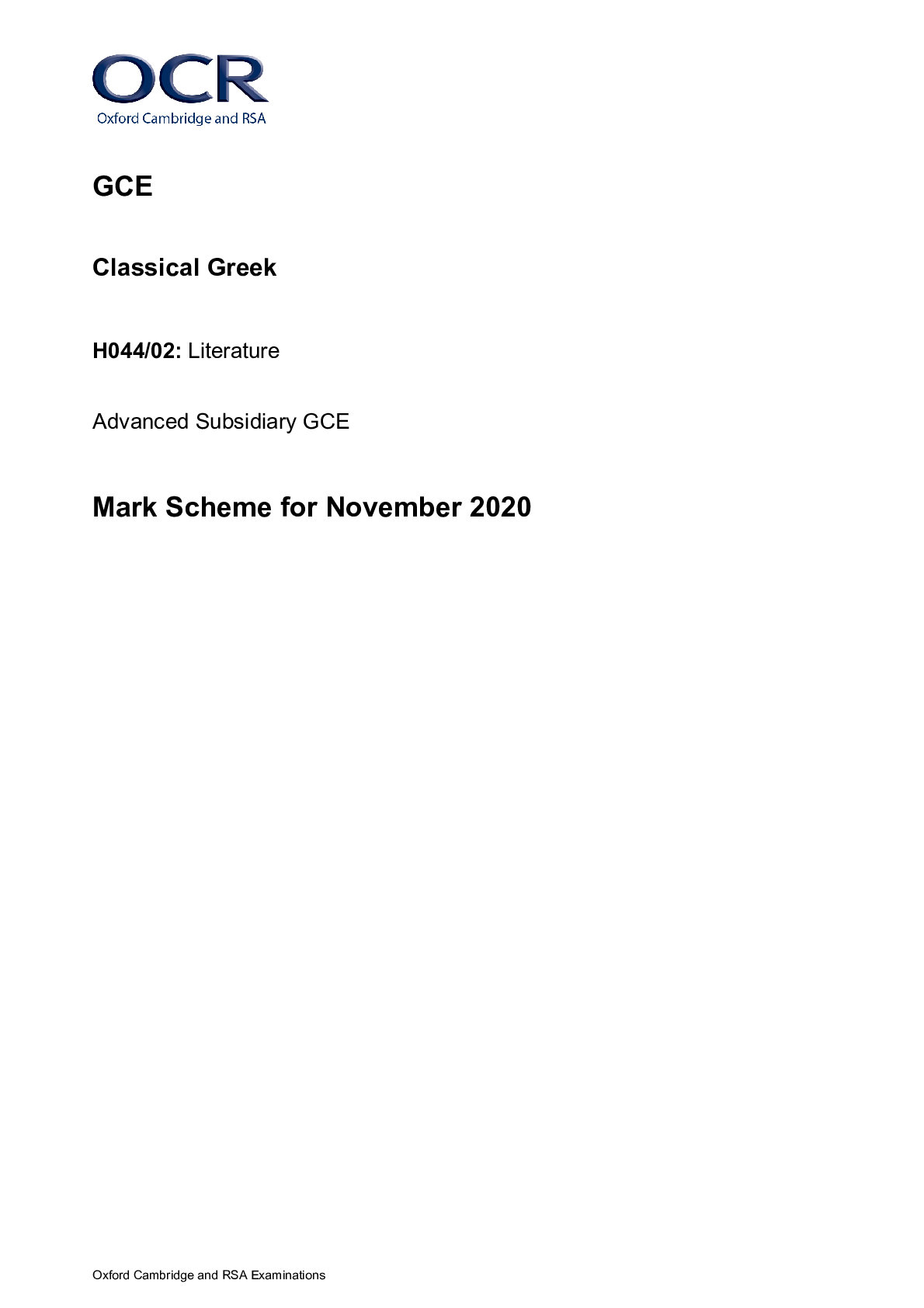
Reviews( 0 )
Document information
Connected school, study & course
About the document
Uploaded On
Oct 10, 2022
Number of pages
32
Written in
Additional information
This document has been written for:
Uploaded
Oct 10, 2022
Downloads
0
Views
48

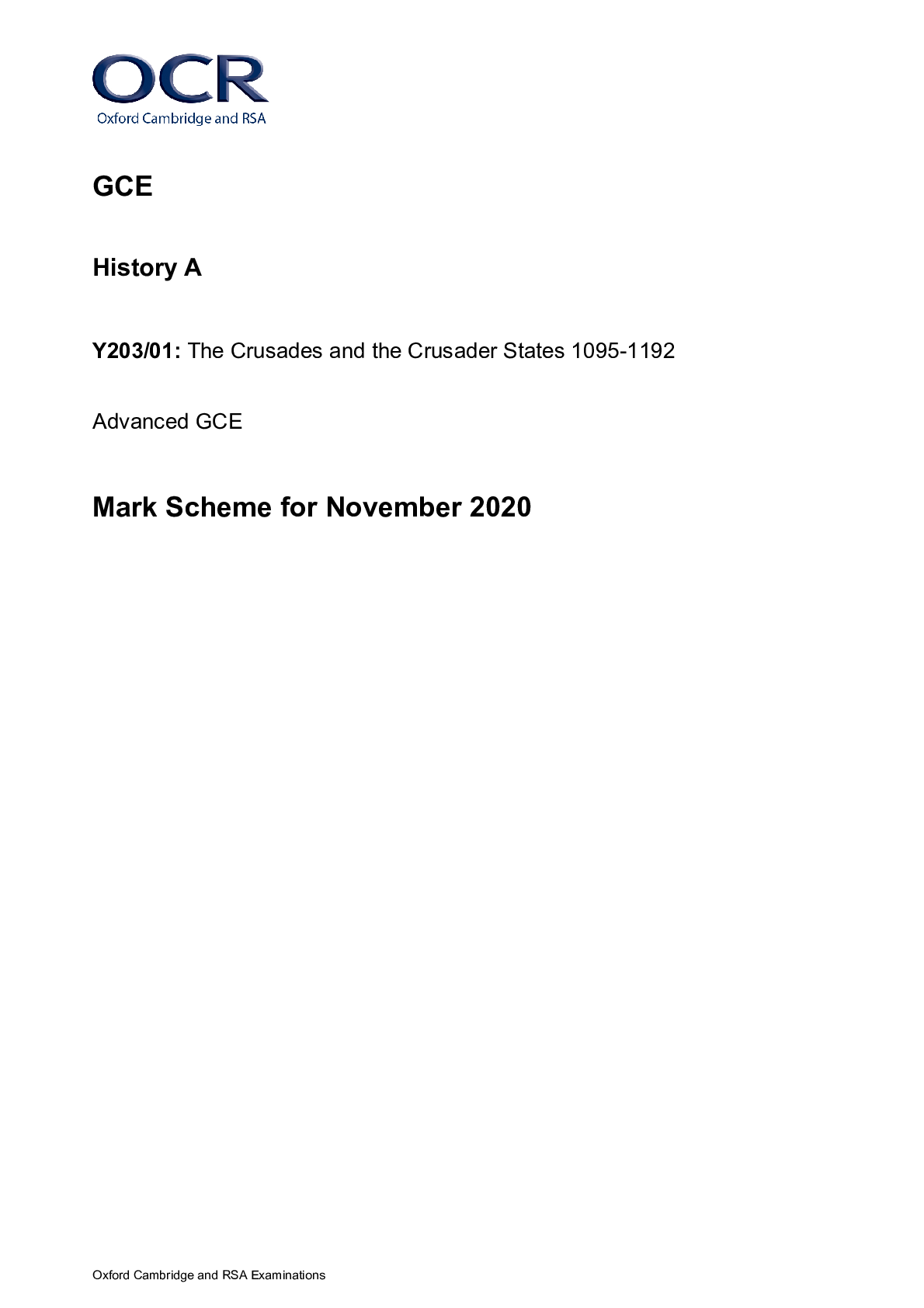
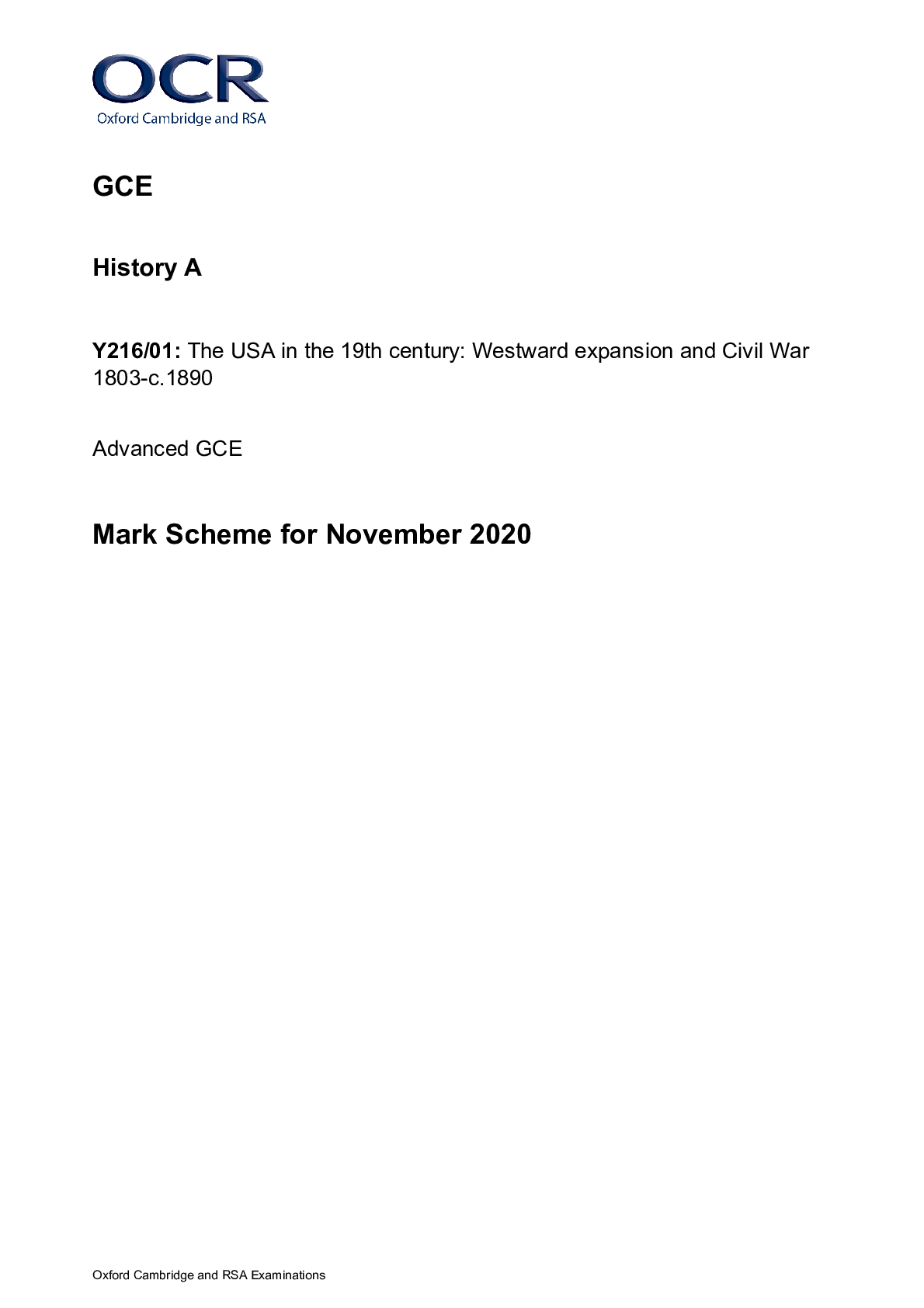
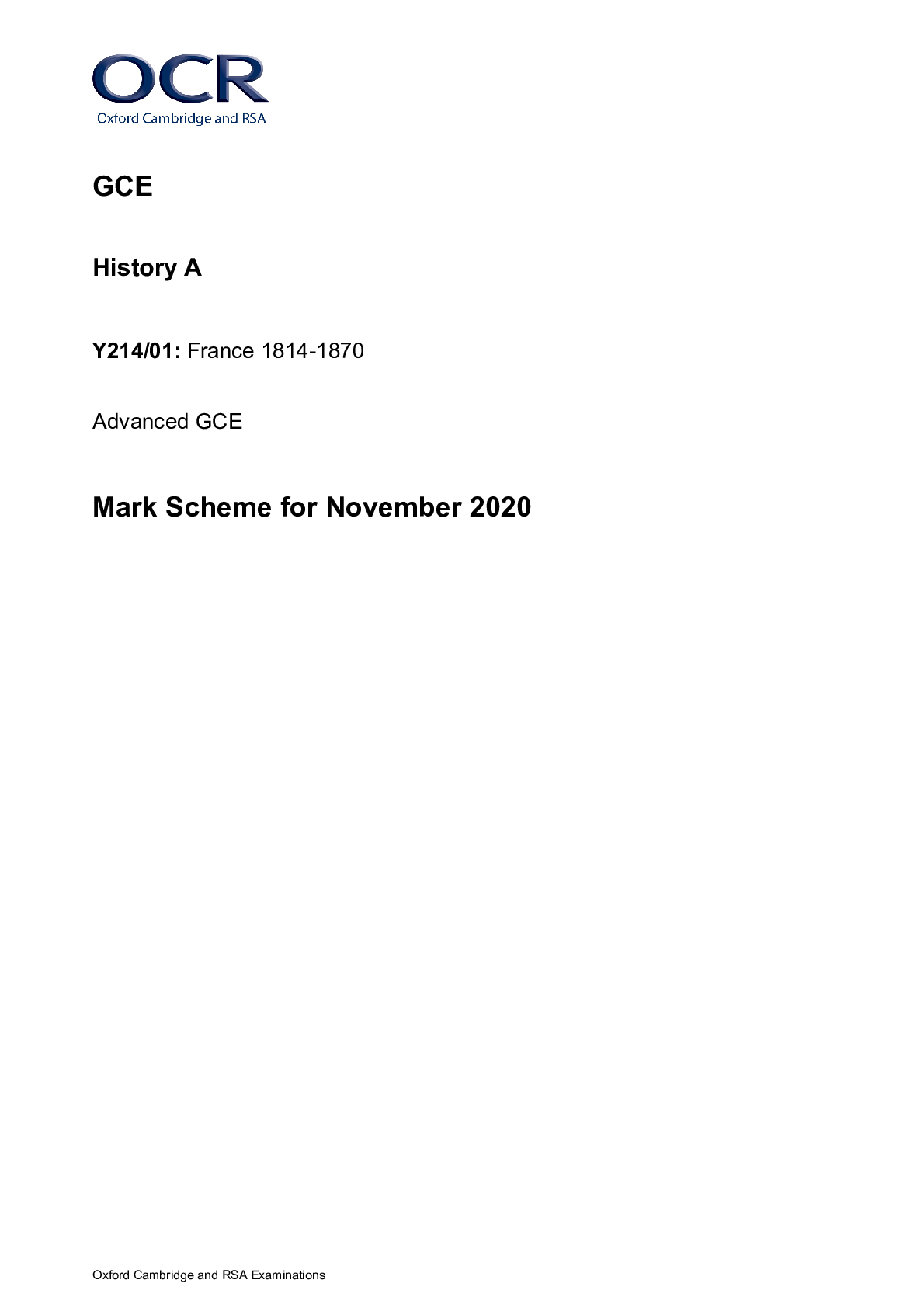
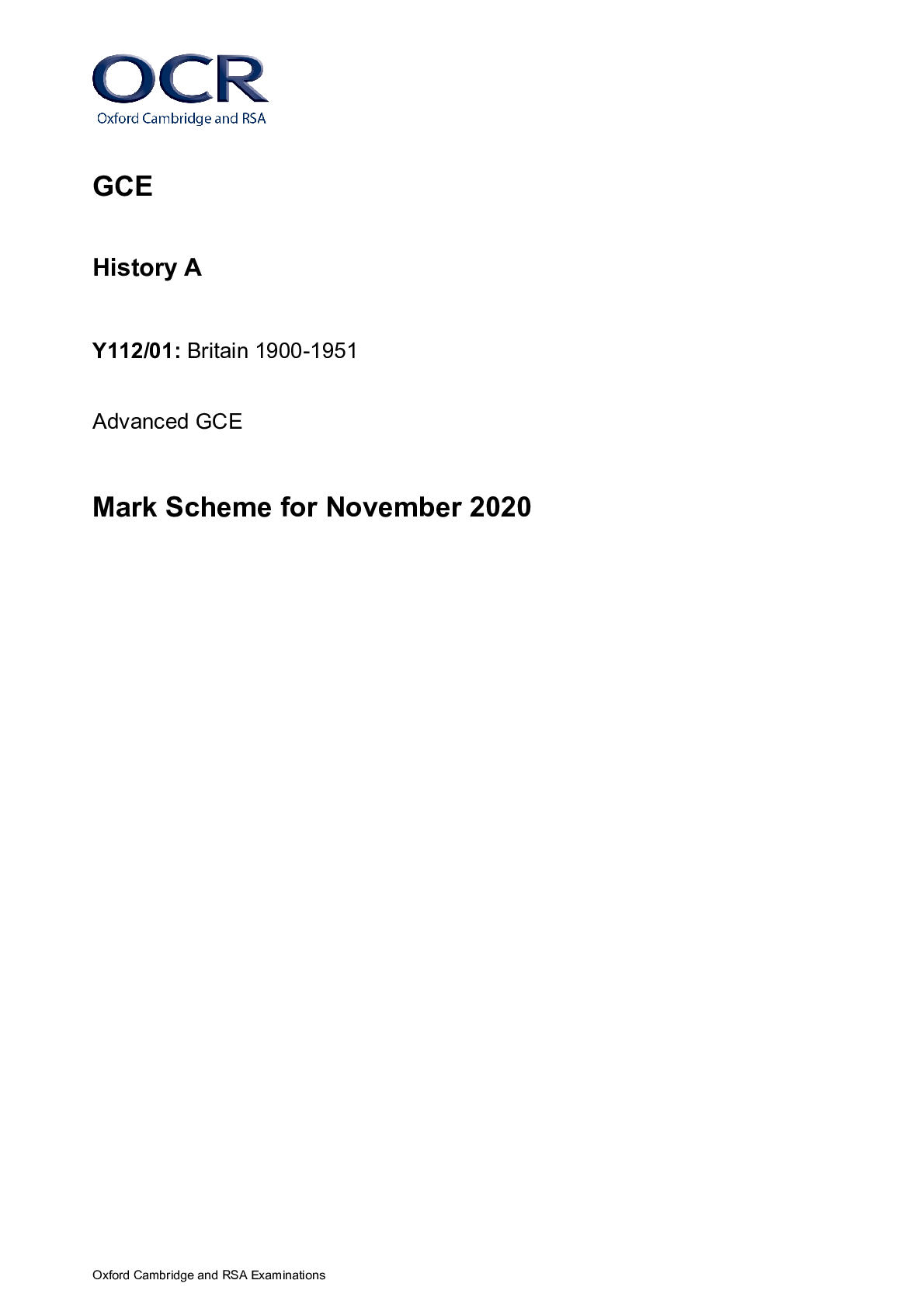
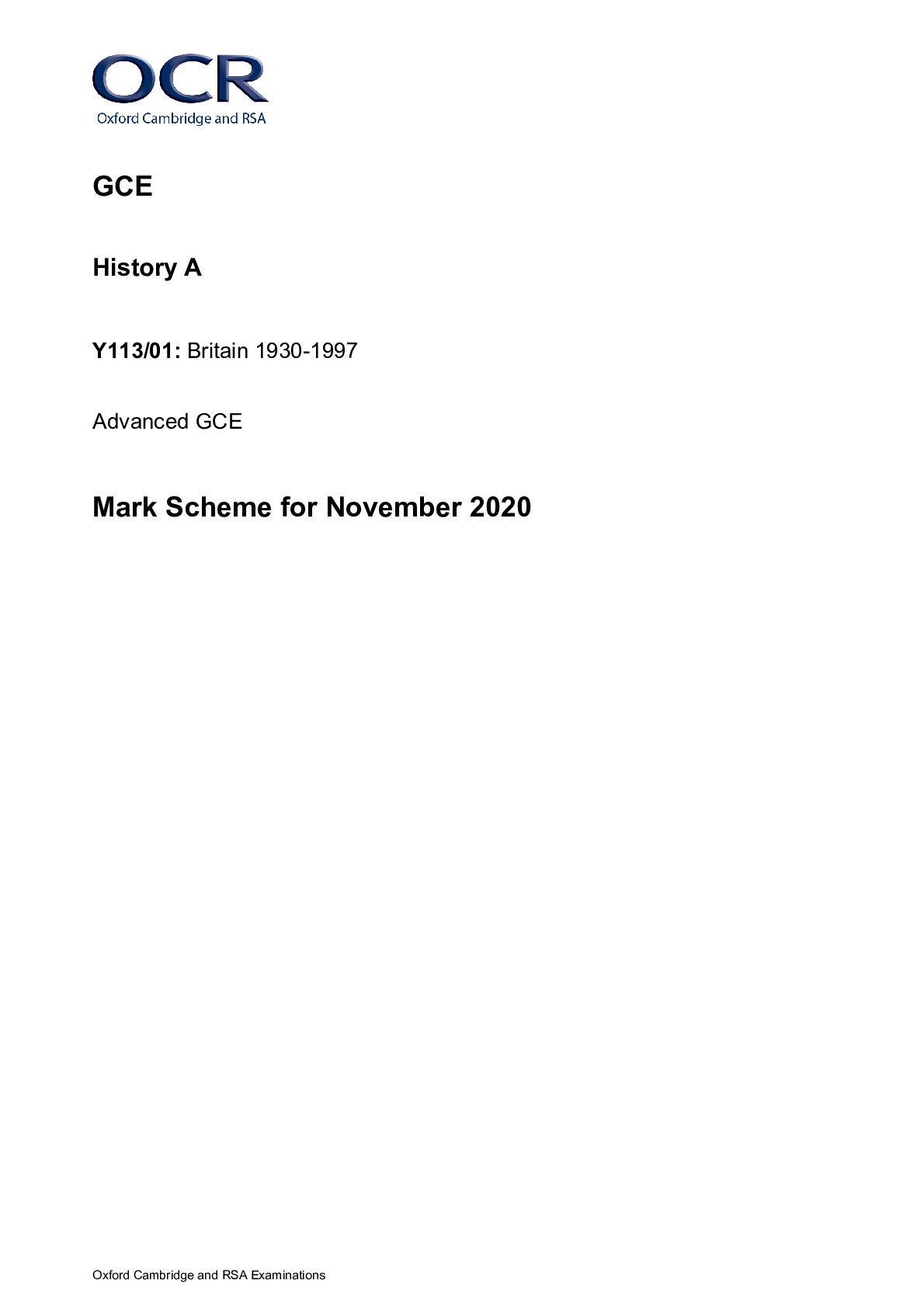
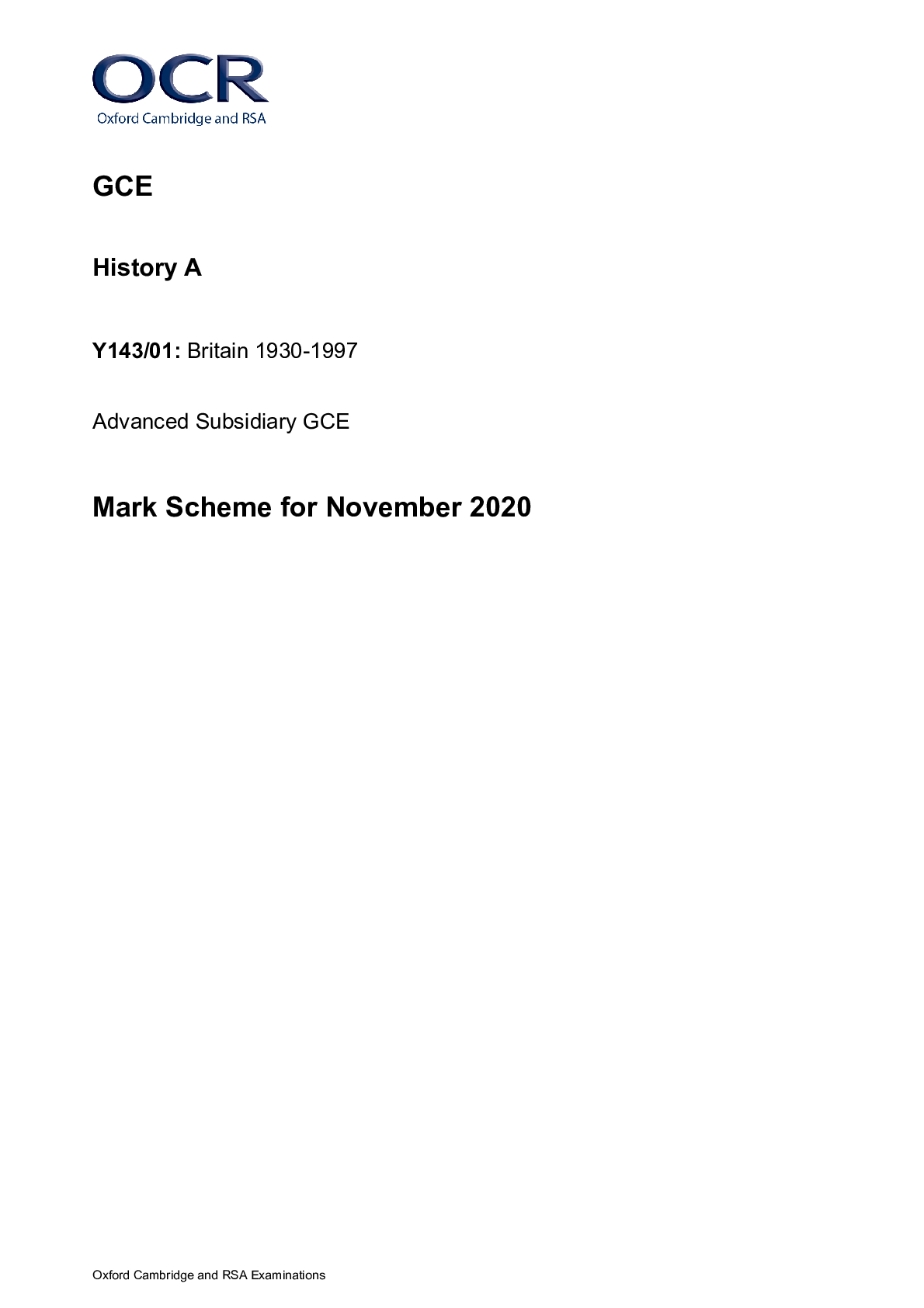
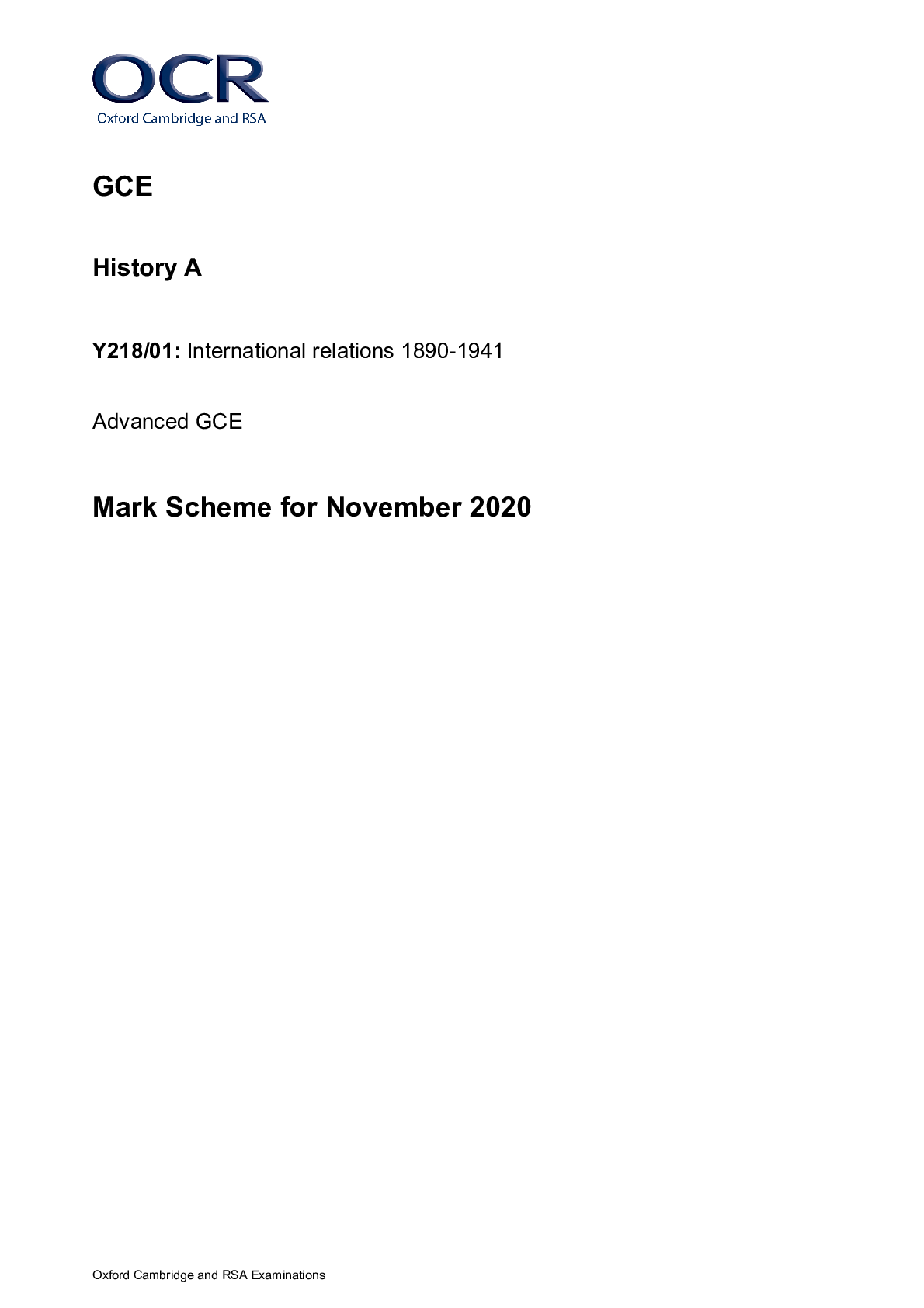
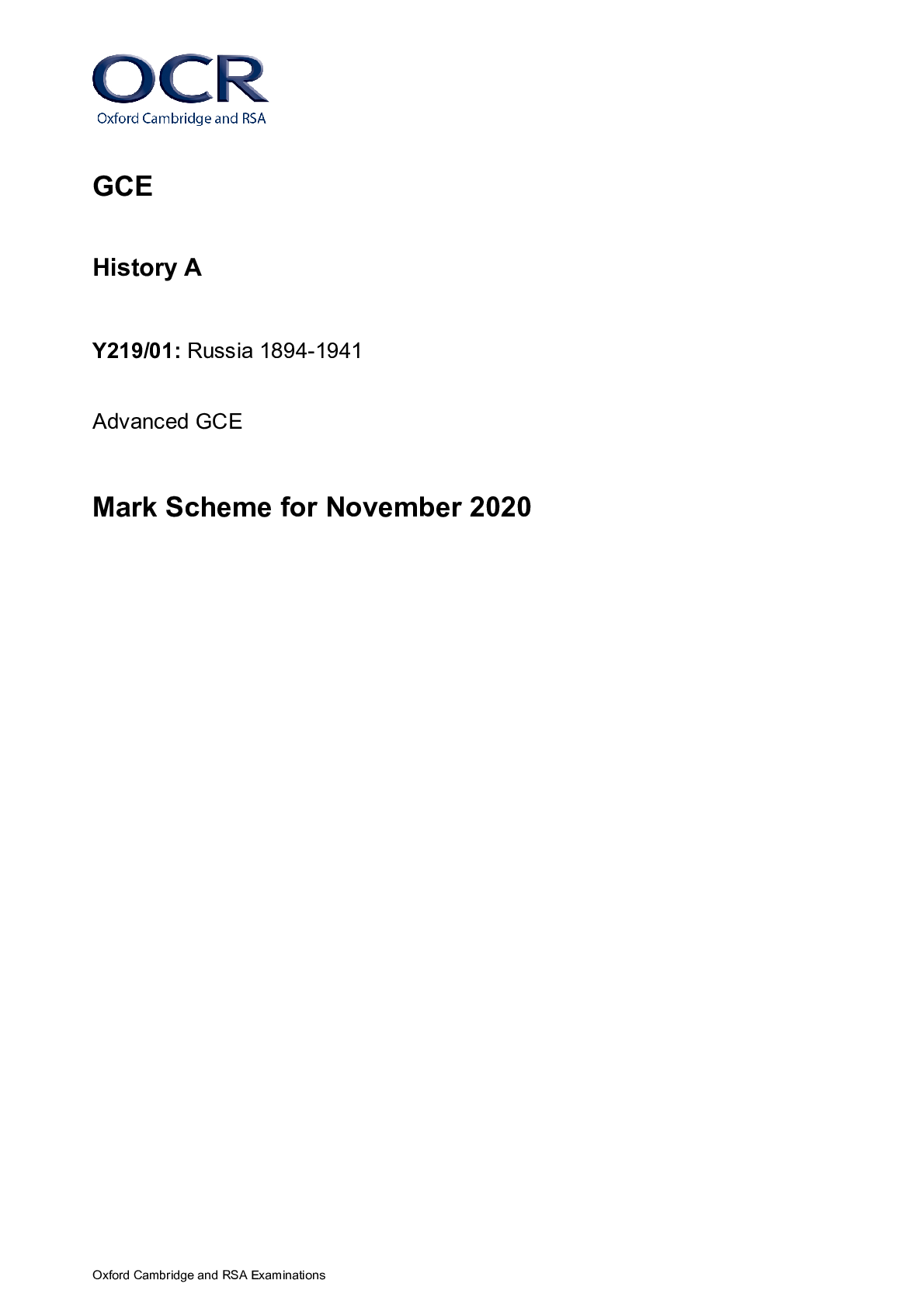






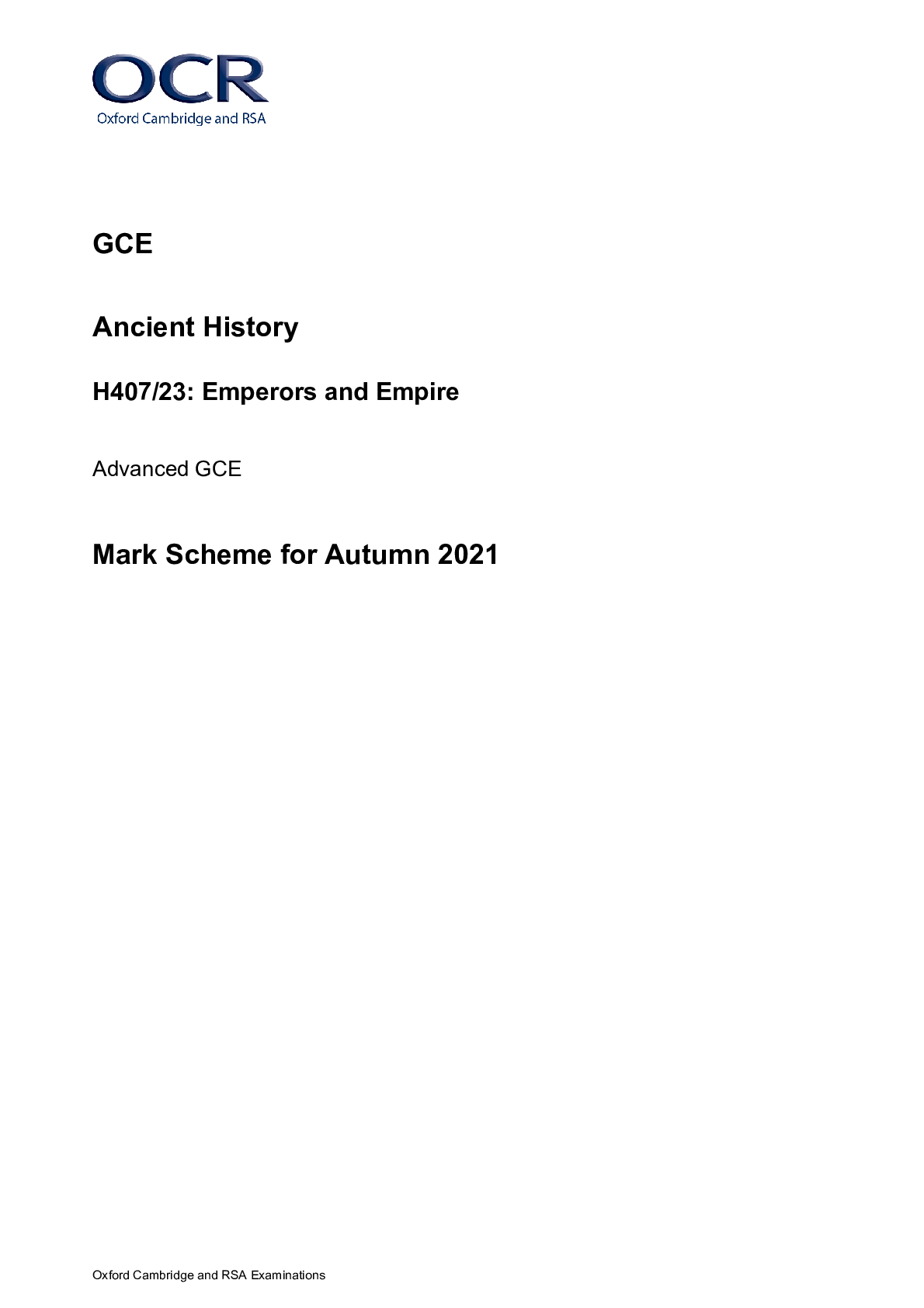
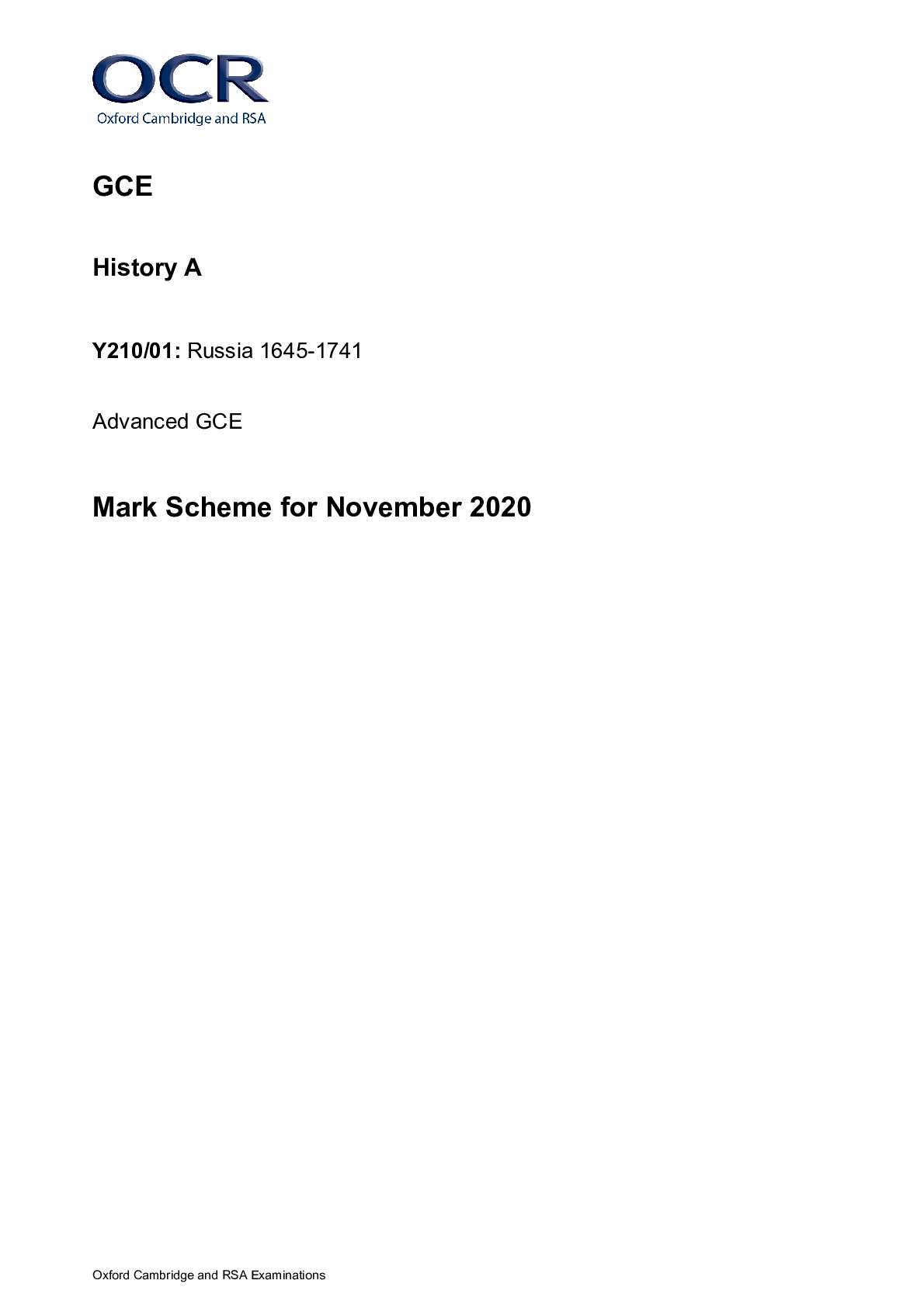
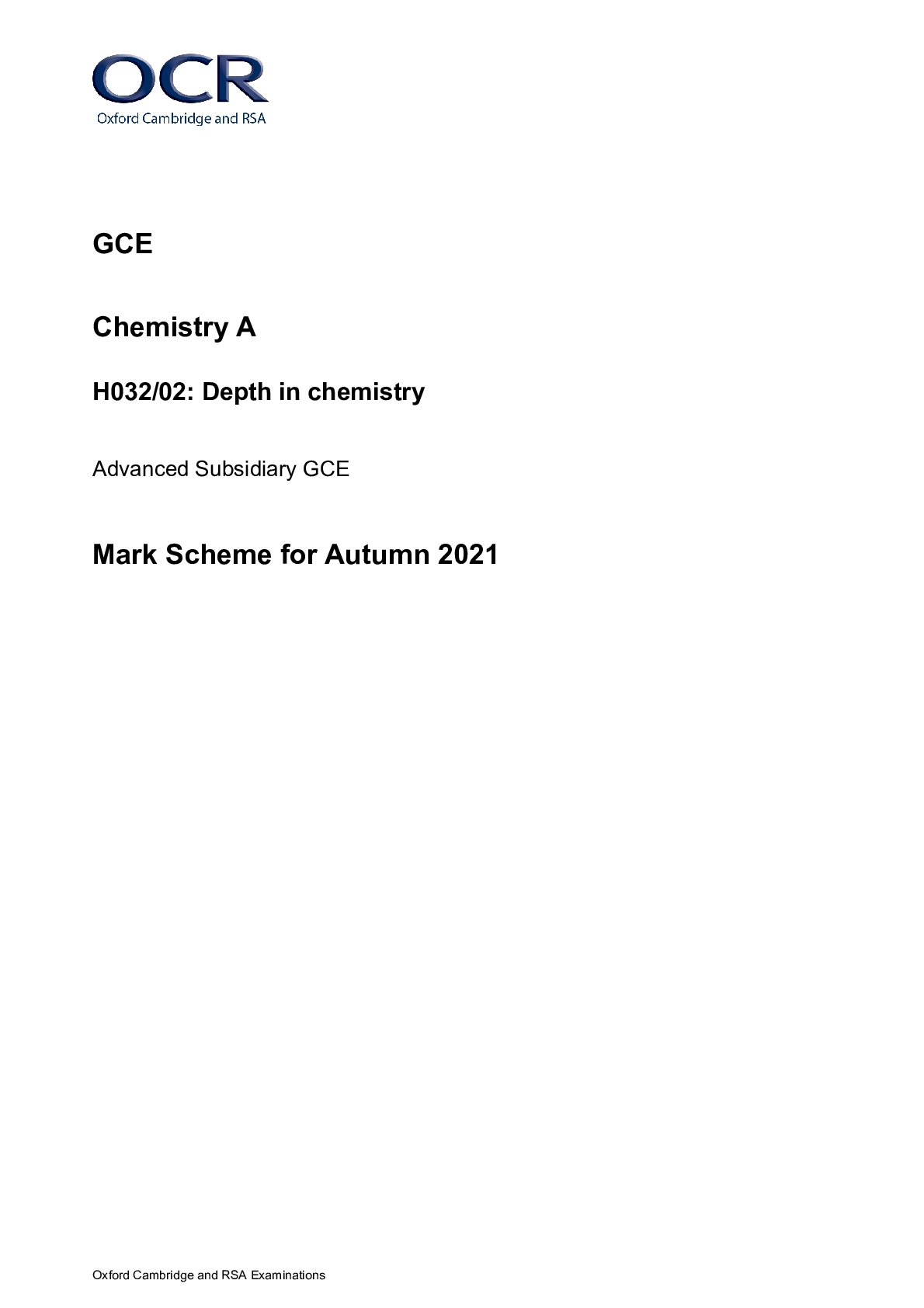
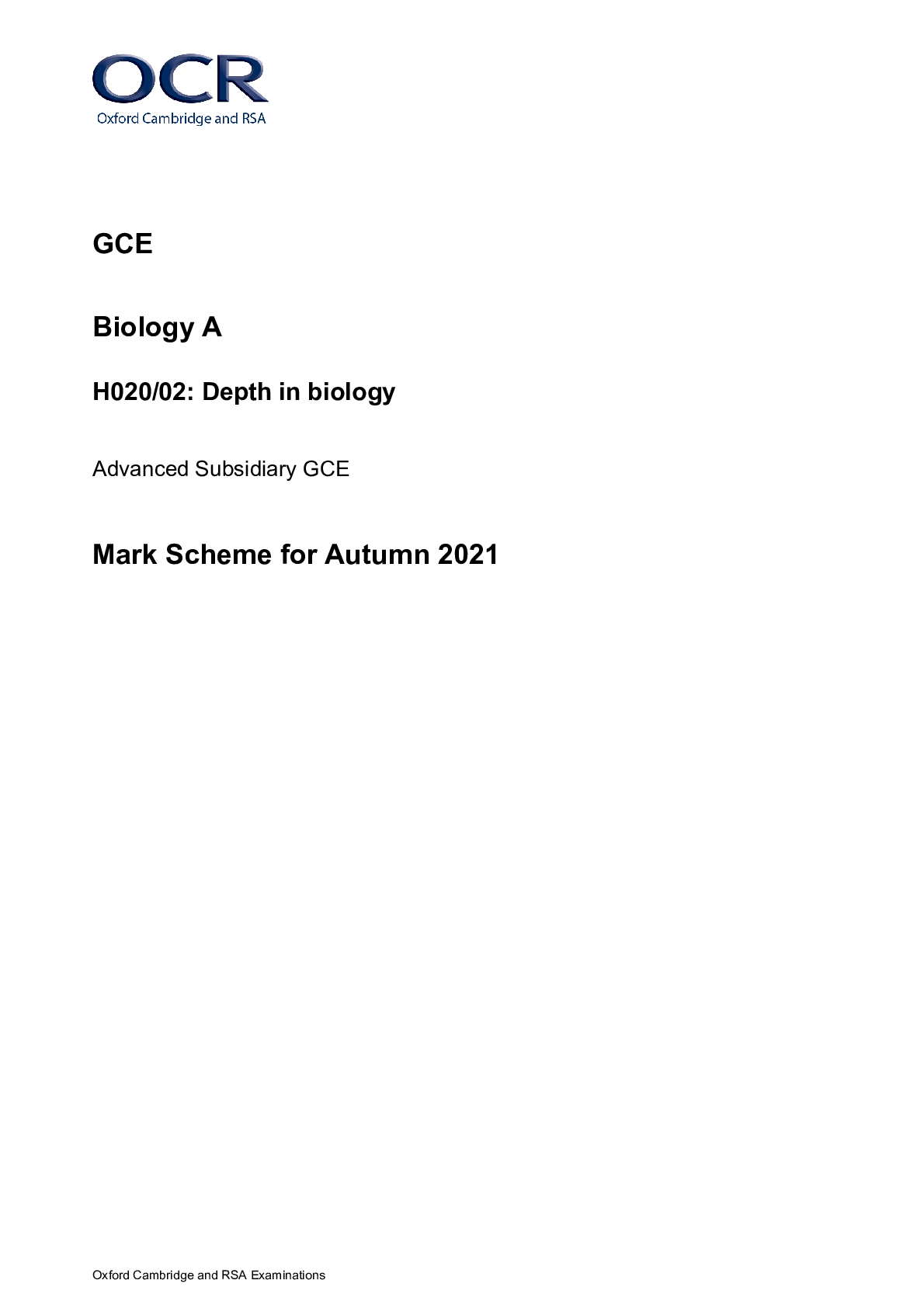
.png)

